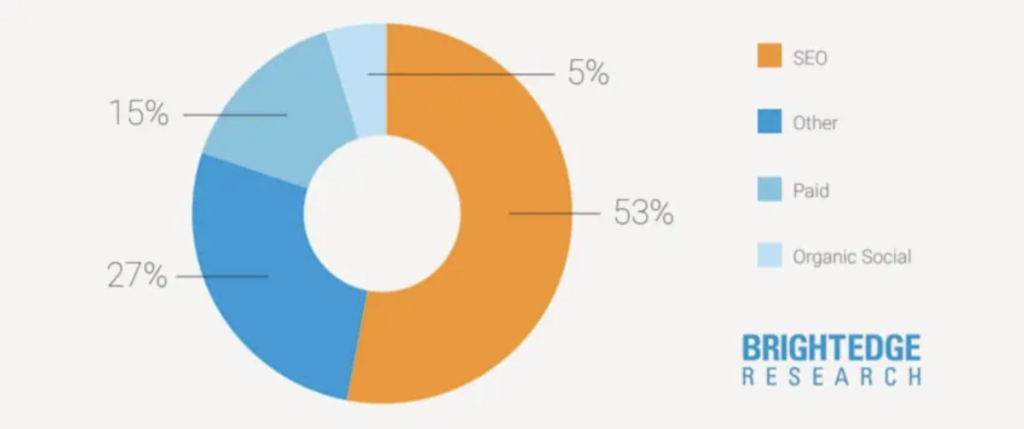By Michael Brenner for Marketing Insider Group
Ever wonder why 45% of content marketers are breaking a sweat over how to scale content marketing? It’s no big surprise, really. Creating top-tier content is a bit like brewing the perfect cup of artisan coffee – it takes time, skill, and a whole lot of beans (or in our case, resources).
But in reality, scaling your content marketing is like upgrading from a cozy café to a coffee empire. It’s tough, sure, but boy, does it pay off! The real question is, how do you amp up your strategy without it becoming a thorn in your side?
Grab your favorite mug and settle in, because we’re about to spill the beans on how to scale your content marketing effectively, ensuring your strategy not only grows, but thrives.
Quick Takeaways
- Modern content marketing thrives on creating personalized, engaging experiences tailored to individual audience preferences.
- As business needs evolve, continuously reassessing and realigning content marketing goals is essential.
- Effectively scaling content marketing requires expanding the team, either through in-house hiring or outsourcing.
- Leveraging technology and automation is key to enhancing content production efficiency and effectiveness in content marketing.
Current State of Content Marketing
So, what’s the buzz in content marketing these days? Personalization and engagement. Gone are the days when generic content could make the cut. Now, it’s like each piece of content needs to be a handcrafted espresso, tailored to the individual tastes of our audience.
In fact, 90% of leading marketers say that personalization significantly contributes to business profitability, underscoring the immense value of custom-tailored content in today’s market.

Image Source: Ninetailed
We’re seeing a trend where content isn’t just about delivering information. It’s about creating an experience, a journey that’s as enjoyable as it is informative.
At Marketing Insider Group, we’re embracing the current state of marketing with open arms. We’re not just writing content; we’re crafting stories, experiences, and connections. The goal is to make each piece of content resonate with an audience on a personal level. You want your readers to feel like each word is written just for them.
In a world where content is king (and queen), staying ahead means being adaptable, creative, and, most importantly, genuine. Don’t just share information. Share your expertise and your passion for what you do.
Regularly Review Your Goals
As your business grows, your needs change too. So it’s worth taking the time to sit down and think about what you really want your content marketing to achieve and if it’s still meeting those goals.
Your goals will naturally grow over time as you attract a wider audience. You can lose track of why exactly you started content marketing in the first place if you start to focus on chasing goals like more traffic and social media shares.
It helps to go back to the basics – the who, what, why, and how?
- Who are you creating content for? Is your customer base changing over time?
- What type of content do you want to create? Do you now have more resources for creating long-form, in-depth content and videos?
- Why exactly are you creating each piece of content? What are the goals you hope to achieve from this?
- How are you creating content? Is your team in-house or are you outsourcing? Have you considered using software to make your content production and promotion strategy more efficient?
Decide what metrics are important for you to track and make sure they’re aligning with your business goals. If you’re getting more traffic to your site but your conversion rate is down, you may have some strategy revisions to do. Make sure your content goals always link back to your overall marketing strategy.
Grow Your Content Marketing Team
One person can only write a finite amount of content in a set period of time. Likewise, a marketer could easily spend their whole day creating posts for social media.
If you want to scale up your content marketing, you need more people – there’s no doubt about it. What you do have a choice in is whether you hire staff for an in-house team or use agencies and freelancers to meet your growing needs.
Video Source: Kotter
For many businesses, the second option is the most attractive and makes the most financial sense. Outsourcing content production to an agency like ours comes with many benefits. You can expand the voice and point of view of your brand with professional writers. You can scale as fast as you want and produce as much content as you need to. And you don’t have to deal with the management issues that come with an in-house team.
Some companies rely on a core marketing team and outsource content production to specialist writers, illustrators, and videographers. Others choose to outsource all their content marketing to an agency. It depends on the individual needs of your business which option is the right one for you.
As your team grows, it can be challenging to maintain a consistent brand voice for your content. Reduce this risk by developing a comprehensive style guide and ensure that everyone involved in content production sticks to it.
Utilize Technology and Automation
AI and automation has already managed to eliminate a lot of repetitive work – and it’s only going to get bigger. In fact, global intelligence software market revenue is expected to grow to $126 billion by 2025.

Image Source: Radixweb
Clearly, we’re not just talking about a little tech upgrade here. This is about transforming the whole game – making content creation and distribution smarter, faster, and a heck of a lot more personalized.
There are already so many marketing automation tools available that can deal with everything from scheduling your posts on social media to personalizing content to each user and moving them through the buying funnel.
AI-powered software can even help you to write content. Machine learning algorithms can optimize content for higher click-through rate and generate the perfect headline at the touch of a button.
If you feel like your current team is struggling with your content production schedule, it’s well worth investigating some tools that can help to lighten the load and make the process more efficient. The idea is not to take jobs away from marketers, but free them up for creative thinking and strategic planning while the computer does the drudge work.
Software tools can also be used to assist in team collaboration and communication. Cloud-based platforms mean that multiple team members can work on one piece of content without worrying about updating the wrong version or constantly emailing back and forth.
Focus On What’s Working Now
Don’t waste your time and resources on producing content that isn’t converting and isn’t bringing in leads. Instead, follow your analytics closely to identify your best-performing content and use it as a template to produce more of the same.
You don’t and shouldn’t need to re-invent the wheel every time you produce a piece of content. To make the process more efficient, make sure your team has a “recipe” or a “roadmap” to follow that is guaranteed to produce a successful result.
When you’re trying to scale it can be tempting to try and do too much, too fast. But there’s no need to start producing flash videos if your existing high-quality content is performing well.
Be analytical with your content marketing strategy and stick with the activities that offer you the highest ROI. Keep experimenting and adapting, but don’t direct too many of your resources towards methods and ideas that haven’t already proven themselves.
SERP Analysis
SERP (Search Engine Results Page) analysis is a crucial part of any great content marketing strategy. It’s more than just rankings; it’s about insights. It’s about understanding not only where we stand, but also the landscape we’re navigating.
In this realm, we’re not just content creators; we’re content strategists. We dissect SERPs to understand the why’s and how’s of top-ranking pages. What makes them tick? Why do they resonate with audiences? It’s about peeling back the layers to uncover the secrets of successful content.
But you have to keep in mind, SERP analysis isn’t a one-and-done deal. It’s an ongoing process, a perpetual game of cat and mouse with search engine algorithms. We’re constantly tweaking, refining, and sometimes overhauling our content to keep up with the ever-changing rules of the game.
Incorporating SEO Techniques
A staggering 53% of all trackable website traffic comes from organic search alone.

Image Source: BrightEdge
So, what does this mean for us? SEO is not just an option. It’s a necessity. Whether you’re a startup or a global brand, your content needs to be as findable as a lighthouse in the dark. We’re talking about making our website a beacon on the vast sea of the internet.
But you have to remember, SEO isn’t just about sprinkling in keywords anymore. It’s about crafting content that’s as engaging as it is visible. And let’s not forget about the other SEO elements: mobile optimization, user experience, and those all-important backlinks.
Master How To Scale Content Marketing Today
Mastering how to scale content marketing hinges on your adaptability, creativity, and deep audience understanding. At Marketing Insider Group, we’re dedicated to evolving with the landscape, personalizing content, and leveraging advanced SEO techniques and technology.
Our goal is to continuously refine our strategies and embrace innovation, creating content that not only reaches but also profoundly resonates with our audience, setting us apart in the ever-changing world of content marketing.
Ready to master how to scale your content marketing? Check out our SEO Blog Writing Service or schedule a quick consultation to learn more about how Marketing Insider Group can help you earn more leads for your business.
